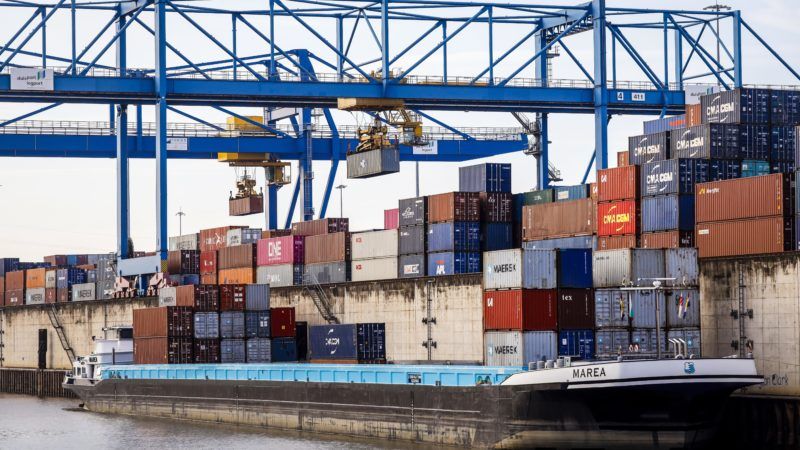The Next Coronavirus Stimulus Package Should Also Repeal Tariffs
Abolishing tariffs would have short- and long-term benefits for the economy.

Members of Congress and the Trump administration are negotiating plans for another round of economic stimulus as the COVID-19 pandemic continues unabated. But before dropping more cash into Americans' bank accounts or bailing out businesses, the federal government should drop the costly tariffs it has imposed since 2018.
Abolishing those tariffs would have both short- and long-term benefits for the economy, argues Ryan Young, a senior fellow with the Competitive Enterprise Institute, a free market think tank. In a new paper he's authored, Young highlights the costs of the trade barriers erected by the Trump administration. He says repealing the tariffs, which have cost about half a percentage point of economic growth per year, according to estimates by the Congressional Budget Office, should be common sense.
A trade war might a "luxury good that we can afford during a boom," Young says, but "not when we have double-digit unemployment and we're looking for ways to stimulate the economy without government spending."
To be sure, this is another case of using the coronavirus pandemic to advocate for the policies you always wanted in the first place. But it's true that Trump's tariff policies have never made much economic sense—Americans are paying for them, and they have so far not forced China to change its behavior on the world stage. It would be a good idea to end the trade war even if the United States weren't diving into a serious recession.
It should be a no-brainer. Young says the bare minimum the administration should do is lift tariffs on health care goods and other items that are essential to fighting COVID-19. But the Trump administration has actually considering raising even more barriers to imports of crucial health care goods by pushing for a so-called "Buy American" policy that would put more regulations between the pandemic-stricken health care system and the supplies it needs.
The White House has quietly admitted that its tariff policies are hurting Americans, but it hasn't done enough yet to undo the damage. In April, the Trump administration set up a process to grant three-month deferrals to some American businesses burdened by the tariffs. But those deferrals fail to recognize the long-term effects of the pandemic or the seriousness of the economic downturn it has caused. Additionally, the executive order creating the deferral process forbade giving breaks to certain tariffs and effectively applies to only about half of all U.S. tariffs.
Unfortunately, Congress has more or less abandoned its never-all-that-serious campaign to recapture the authority over trade and tariffs. It is unlikely that significant tariff relief will be part of the next stimulus bill, even though it would be an obvious and easy boost for the economy.
The best we can hope right now is that the administration won't impose additional trade barriers while the country is being battered by COVID-19.
Show Comments (53)